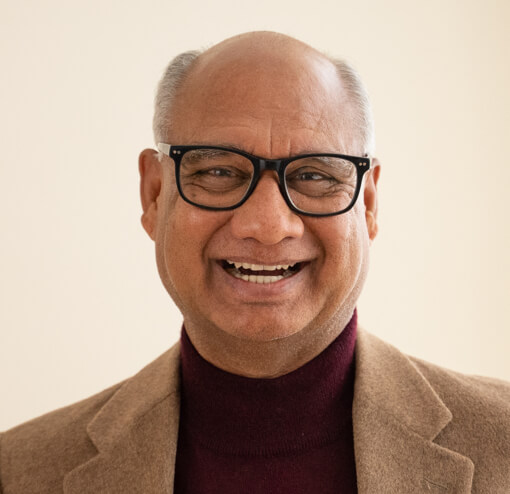Rishicha is a sage known for his extraordinary knowledge of the sciences of mantra, tantra, ayurveda, and alchemy. He is the grandson of the sage Bhrigu and the grandfather of the valiant warrior-sage Parashurama.
Rishicha married King Gadhi’s only child, Satyavati. For a long time the princess and her husband waited in vain for a baby. One day, the queen visited her daughter and reminded her, “The hopes of two genealogies rest with you. I am heirless; so are you. Your husband is an enlightened soul, the sole custodian of the knowledge that makes the lineage of Bhrigu outshine other traditions. Because you also embody a high degree of knowledge and non-attachment, these worldly matters may not weigh too heavily on you. But imagine the worry that has been eating at your father and me. I’m close to passing my childbearing years. Please ask Rishicha to bless the king and me with a son.”
Rudra Yaga: Invoking the Life Force
Upon hearing this request from his wife on the queen’s behalf, Rishicha used his yogic powers to enter the depths of divine providence. There he saw that providence held two extraordinary souls—one for his in-laws and one for his wife and him. Rishicha knew that such extraordinary souls come to this mortal plane in an extraordinary manner. Following the injunctions laid down by the Sri Vidya tradition, he undertook the exalted practice of Rudra Yaga, a practice for invoking and propitiating the primordial pool of the life force. Part of the practice included rituals centered on an altar. On that altar sat two vessels containing the essence of herbs known as charu. Rishicha invoked celestial wombs in these two vessels. With the power of his mantra shakti, tapas (austerity), and bhakti (devotion), he requested the life force to descend into these vessels. At the completion of the practice, he handed one vessel to his wife and the other to his mother-in-law. He taught them the proper way of drinking the herbal elixir and explained they should drink it in complete privacy, with an attitude of respect.

Almost immediately a thought flashed in the queen’s mind: “The elixir Rishicha gave his wife must be more potent than the one he gave me—it is natural for a parent to desire the most valiant offspring.”
Before they drank the elixir, the queen told her daughter what was in her mind. “Don’t you want a valiant brother, capable of expanding your father’s kingdom?” she pleaded. “If your son turns out to be less than the best, your capable husband will find a way to make him become outstanding. History will remember your sacrifice, my daughter. Let us exchange our vessels.” Agreeing, the daughter exchanged vessels with her mother.
Unintended Results
A few weeks later, the sage Rishicha was alarmed to see a unique glow on his wife’s face. He told her, “The unique alchemy of the herbs contained in the vessel I gave you was vested with the power to fertilize the womb so that the fetus gets everything it needs to become a brilliant baby with a sattvic, peaceful, illuminating nature. But the alchemy of the herbs in your mother’s vessel was designed for a valiant baby with a rajasic, vigorous nature. The glow on your face tells me you have taken the elixir meant for your mother.”
His wife confessed to switching the vessels. “Please do something,” she pleaded. “Protect me from becoming instrumental in staining the peace-loving, compassionate lineage of Bhrigu.”
Rishicha is a sage known for his extraordinary knowledge of the sciences of mantra, tantra, ayurveda, and alchemy.
“I cannot undo what has already been done,” Rishicha replied. “All I can do is pray that the effect of the elixir skips a generation. We will have a saintly child befitting the standards of our ancestors. However, the temperament of a warrior will manifest in our grandson. That temperament will show itself only for a while. Then his sattvic qualities will manifest and his legacy will endure forever.”
The scriptures tell us the couple was blessed with a son named Jamadagni, which means “glowing fire.” His was a life of tapas (austerity), svadhyaya (self-study), and Ishvara pranidhana (trustful surrender to God). He was an embodiment of unconditional love and forgiveness.
But Jamadagni’s son, Parashurama, was valiant in every respect. A warrior of the highest caliber, he had absolutely no tolerance for injustice. When Jamadagni was murdered, Parashurama avenged his death by ruthlessly annihilating not only the king who had killed his father, but also the king’s offspring, his entire clan, and anyone in the kingdom who resisted the slaughter. He stopped killing only when his guru reminded him that the violence would neither please his ancestors nor bring him peace. Thereafter, Parashurama committed himself to intense austerity, which transformed him so completely that he earned the epithet Bhagavan, “Lord.” Bhagavan Parashurama has been the living guide for seekers in our tradition for millennia.

Why the Higher Practices Are Kept Secret
Human beings have not yet learned to use nature’s blessings properly. That is why the tradition expects us to keep the higher practices of mantra, tantra, and alchemy secret. It is a great honor to have the knowledge of mantra vidya. An adept with direct experience of mantra vidya understands the importance of sharing this knowledge only at the right time and in the right proportion.
The highly evolved practices of tantra have acquired a bad reputation because tantra vidya fell into the hands of people with degraded minds. There was a time when the ancient cultures of India, China, and Europe benefited from the knowledge of alchemy. But the misuse of alchemy contributed to the decline of those cultures. Preserving these esoteric sciences and passing them on to successive generations is the central duty of our tradition.
